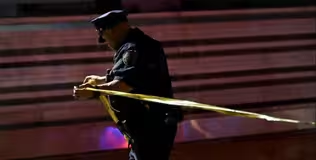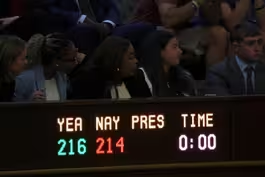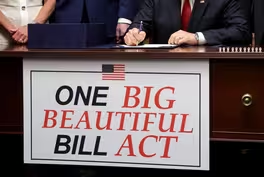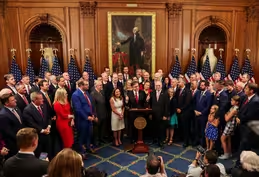
Ukraine concerned after U.S. holds back promised weapons
Clip: 7/3/2025 | 8m 35sVideo has Closed Captions
As Pentagon pauses some weapons for Ukraine, experts weigh in on U.S. priorities
Earlier this week, the Trump administration announced it had suspended some weapons deliveries to Ukraine. The Defense Department says the U.S. needs the weapons to be ready for its own contingencies. Nick Schifrin discussed the move with Kimberly Kagan of the Institute for the Study of War and Jennifer Kavanagh of Defense Priorities.
Problems playing video? | Closed Captioning Feedback
Problems playing video? | Closed Captioning Feedback
Major corporate funding for the PBS News Hour is provided by BDO, BNSF, Consumer Cellular, American Cruise Lines, and Raymond James. Funding for the PBS NewsHour Weekend is provided by...

Ukraine concerned after U.S. holds back promised weapons
Clip: 7/3/2025 | 8m 35sVideo has Closed Captions
Earlier this week, the Trump administration announced it had suspended some weapons deliveries to Ukraine. The Defense Department says the U.S. needs the weapons to be ready for its own contingencies. Nick Schifrin discussed the move with Kimberly Kagan of the Institute for the Study of War and Jennifer Kavanagh of Defense Priorities.
Problems playing video? | Closed Captioning Feedback
How to Watch PBS News Hour
PBS News Hour is available to stream on pbs.org and the free PBS App, available on iPhone, Apple TV, Android TV, Android smartphones, Amazon Fire TV, Amazon Fire Tablet, Roku, Samsung Smart TV, and Vizio.
Providing Support for PBS.org
Learn Moreabout PBS online sponsorshipWILLIAM BRANGHAM: Today, the Russian military confirmed that Ukraine killed Major General Mikhail Gudkov, the deputy head of Russia's Navy, and one of the most senior Russian military officers to have been killed since Russia's full-scale invasion in 2022.
Also today, President Trump spoke with Russian President Vladimir Putin and confirmed that the U.S. is withholding some weapons from Ukraine.
DONALD TRUMP, President of the United States: We're giving weapons, but we have given so many weapons, but we are giving weapons, and we're working with them and trying to help them, but we haven't.
Biden emptied out our whole country giving them weapons, and we have to make sure that we have enough for ourselves.
WILLIAM BRANGHAM: That decision has sparked intense debate this week from Washington to Kyiv.
Nick Schifrin has more.
NICK SCHIFRIN: The weapons deliveries that the Trump administration is withholding from Ukraine include a number of Patriot air defense missiles that had been appropriated by last term's Congress and authorized by the Biden administration.
It's also holding back 155-millimeter artillery shells and other weapons, as Russia has been pounding Ukraine on the front lines and with missile and drone barrages every night.
Ukraine says it needs these weapons to defend itself, but, as the president suggested, the Department of Defense concluded the U.S. needs these weapons to be ready for its own contingencies.
So, is this move in America's interests?
For that, we get two views.
Kimberly Kagan is the president of the Institute for the Study of War, a Washington think-take.
And Jennifer Kavanagh is a senior fellow and director of military analysis at Defense Priorities, which advocates for restraint in U.S. foreign policy.
Thanks very much.
Welcome both of you to the "News Hour."
Jennifer Kavanagh, let me start with you.
Bottom line, do you think the Trump administration has made the right call to withhold some of these weapons to Ukraine?
JENNIFER KAVANAGH, Defense Priorities: I do think it's the right call, and it's a necessary call.
The number one priority for the Pentagon has to be making sure that U.S. military forces are ready to protect themselves and to execute their top priority missions abroad.
And right now, the Pentagon has made clear that those are, number one, homeland defense, number two, Asia, number three, Middle East.
Ukraine is simply not an existential threat to the United States.
It's the lowest priority.
The Pentagon has also made clear that this is a pause, not a halt.
They're reviewing arms deliveries, and they're continuing to provide other types of weapons that are in greater supply.
But U.S. stockpiles are very low, even to the point of interfering with training.
So this is a necessary and I believe the right decision.
NICK SCHIFRIN: Kim Kagan, take on those arguments.
Stockpiles are low and Ukraine is not existential for the U.S. KIMBERLY KAGAN, President, Institute for the Study of War: The purpose of U.S. engagement in Ukraine is actually the protection and security of the United States and its allies and partners abroad.
The reason to supply Ukraine with arms and weapons is that it is essential to stop Putin on the battlefield, because Putin doesn't want to negotiate for a cease-fire.
And so Ukraine needs those weapons in order to be able to continue to defend itself.
And providing those weapons shows that the United States is strong, tough, and serious and willing and able to support friends and allies abroad.
NICK SCHIFRIN: So, Jennifer Kavanagh, take those arguments.
The weapons can stop Putin on the battlefield, and that last point Kim Kagan was making, that showing the U.S. is committed to Ukraine does have more strategic impacts, for example, on China.
JENNIFER KAVANAGH: Well, first of all, Ukraine's biggest problem right now is not shortage of weapons, but a shortage of manpower.
They simply don't have enough personnel to man their front lines and they're suffering very high to desertion rates, which is understandable, given that their soldiers have been fighting now for over three years, some of them without a break.
So more weapons isn't going to be the solution to Ukraine's real problem here.
Thinking about Putin's calculus, Putin in his call with Trump today made it clear that he has a set of goals that he aims to achieve, and he will push until he achieves those goals, almost regardless of what the West does.
So this isn't going to change his calculus either.
As far as how the rest of the world interprets the U.S. decision, I'm sure Beijing and Iran and other U.S. adversaries would love to see the United States continue to send its valuable and precious munitions to Ukraine, because it means that there's fewer that the United States can use in conflicts in those regions.
If anything, the number one U.S. adversary, China, should -- would see this as a sign of resolve, that the United States is finally doing what it said it's going to do for the past over 10 years of beginning to prioritize and conserve its military resources to focus on the Asian theater.
NICK SCHIFRIN: So, Kim Kagan, take those arguments on the better way to deter China is to prioritize weapons toward China, and also more weapons will not make a difference on the front line in Ukraine.
KIMBERLY KAGAN: First of all, the bureaucratic reprioritization of weapons allocation is not going to deter an aggressor like Xi Jinping.
The way that the United States needs to deter Xi Jinping is to show, first of all, that it has the capability to act both militarily and through other means.
And the second way is to show that it will actually support vulnerable partners in the region in order to make sure that they are protected from conquest.
So there's a direct relationship between what happens in Ukraine and what happens in Taiwan.
And, furthermore, it is essential that the United States recognize that its ability to deter and defend itself is actually really about developing the defense industry and the military capability of the United States and the free world.
Right now, saving several dozen Patriot interceptors that could save the lives of civilians in Ukraine does not actually prepare the United States for a conflict with China or defend it against Iran.
Investing in the capability to manufacture and develop sophisticated missile interceptors is what we need to protect ourselves in the future.
NICK SCHIFRIN: We have only got about a minute and 20 seconds left, so this will be a bit of a lightning round for a key question for both of you.
As you said, Jennifer Kavanagh, President Trump referred to his call with Putin tonight.
He actually said -- quote -- "I'm not happy about that.
I didn't make any progress with him at all."
Very quickly, what do you think the best way to get toward peace in Ukraine is?
JENNIFER KAVANAGH: I mean, ultimately, it has to be a decision of the two combatants to be ready to stop fighting.
And it's clear that we're not at that point yet.
So there's really little that the United States can do right now, in my view, to force Putin to negotiate.
Zelenskyy has been more open to a cease-fire, but his terms, the terms of the deal that he's looking for, are still quite maximalist.
So, ultimately, there isn't that much that the United States can do.
I think that, if we look into the future, maybe the fall, there could be an opening for more serious diplomacy.
But in the very near term, the number one thing the United States needs to do is to protect its own interests and conserve those munitions.
NICK SCHIFRIN: Kim Kagan, the best thing the U.S. can do?
KIMBERLY KAGAN: The United States needs to support Ukraine, so that Ukraine can not only do as it has been doing, which is holding the line against Russian assaults, causing one million Russian casualties, and making it so that the Russian rate of advance in Ukraine would gain it Ukrainian territory in 83 years.
So, the United States actually needs to arm Ukraine, so that it can continue the war and change Putin's expectations that either the United States or Ukraine will simply surrender.
NICK SCHIFRIN: Kim Kagan, Jennifer Kavanagh, thank you very much to you both.
KIMBERLY KAGAN: Thanks for having us.
JENNIFER KAVANAGH: Thank you.
Chicago sees historic drop in violent crime
Video has Closed Captions
Clip: 7/3/2025 | 5m 11s | Chicago sees historic drop in violent crime during first half of 2025 (5m 11s)
House GOP passes Trump’s big tax bill by his July 4 deadline
Video has Closed Captions
Clip: 7/3/2025 | 7m 47s | House gives Trump a win as his big tax bill overcomes weeks of tense negotiations (7m 47s)
How manufacturers will benefit from Trump’s big bill
Video has Closed Captions
Clip: 7/3/2025 | 5m 18s | How businesses and manufacturers will benefit from Trump’s big bill (5m 18s)
'Make It Ours' explores how Virgil Abloh redefined fashion
Video has Closed Captions
Clip: 7/3/2025 | 8m 18s | Robin Givhan's 'Make It Ours' explores how Virgil Abloh helped redefine fashion (8m 18s)
News Wrap: Supreme Court will hear trans athlete cases
Video has Closed Captions
Clip: 7/3/2025 | 5m 38s | News Wrap: Supreme Court will hear transgender athlete cases in its next term (5m 38s)
Trump withholds billions in grants for school programs
Video has Closed Captions
Clip: 7/3/2025 | 5m 13s | Trump administration withholds billions in school grants for critical programs (5m 13s)
Why Republicans opposed to Trump's bill changed their minds
Video has Closed Captions
Clip: 7/3/2025 | 5m 57s | Why Republicans once staunchly opposed to Trump's bill changed their minds (5m 57s)
Providing Support for PBS.org
Learn Moreabout PBS online sponsorshipSupport for PBS provided by:
Major corporate funding for the PBS News Hour is provided by BDO, BNSF, Consumer Cellular, American Cruise Lines, and Raymond James. Funding for the PBS NewsHour Weekend is provided by...


















